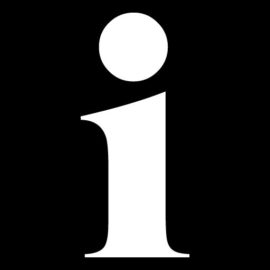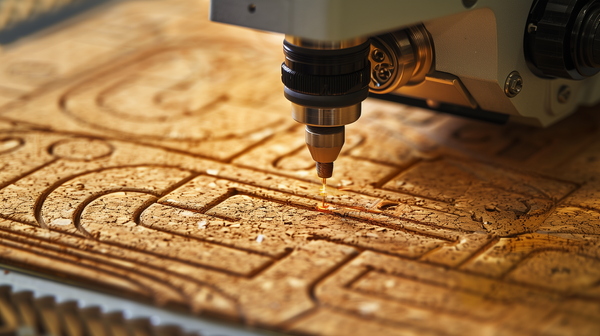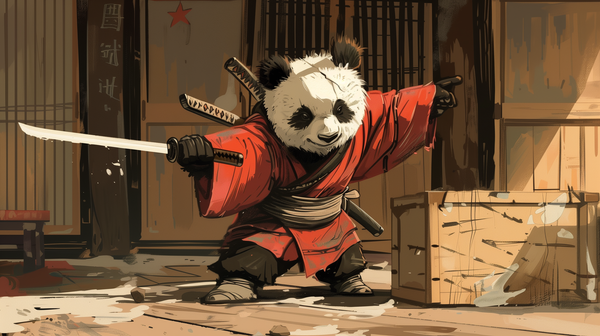New Year resolutions are lame, stick to the old ones
Let me share with you the best advice I received in 2022 and will continue to apply in 2023. Habits are more powerful than resolutions and here are the 5 ones I've found most powerful.
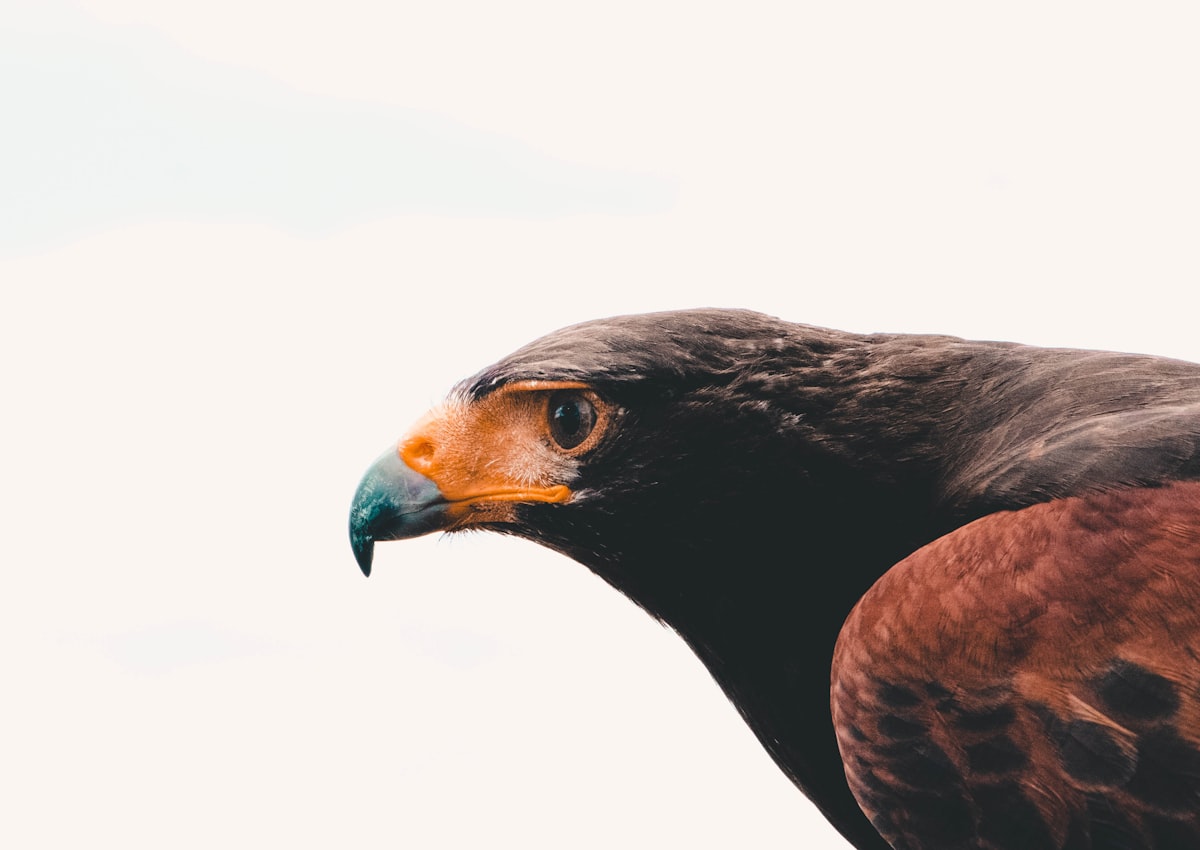
Or better yet, make habits instead of resolutions.
We just said goodbye to 2022 and welcomed in 2023, and I think this is a time to reflect on all that has happened in the past year and to look forward to what the new year has in store.
I can’t help it, I’ve got an engineering mindset after all those years of school, so I take a methodical approach when doing this, listing out the lessons learned, reviewing the life and year goals, the roadmap to get there, and so on. Anyways, I like to think that a big chunk of where our life is going does depend on us and that we are capable of controlling it, to a certain extent.
For me, 2022 was a year of deep self-evaluation and change regarding my personal goals, my attitude toward life, and many of the habits that sculpt where I am heading to.
At the beginning of last year, I was scattered and without purpose, I did not like where I was going and I didn’t seem to manage to do anything about it. I started reading books about personal development, lifestyle design, productivity, focus, and all that kinds of topics I used to not like because I thought it was lame, or unnecessary.
I was wrong. Reading and meditating about my habits, along with psychological therapy, helped me start 2023 in a completely different situation. The three most impactful books I read last year were these:
- Deep Work, by Cal Newport: focus on the wildly important, and use your time effectively.
- The 4-Hour Workweek, by Tim Ferriss: being rich or successful is about having time for yourself and using it actually to live. Cut the “fat” out.
- Show Your Work!, by Austin Kleon. Well, I started this blog.
I will not write a review of those books right now - maybe for a later post. What I want to share is some of the takeaways I actually started applying to my life, and the results I see. By reading those books, I was able to receive the best advice I could ask for, and will continue to apply in 2023.
As a general idea, sticking with older plans laid on good foundations is far better than making new ones out of nowhere without real purpose.
The key is knowing where you want to be, and determining what you need to do to get there. It’s a sort of existential compass, or the Japanese term “Ikigai”, as I learned from Chris Do, at The Futur. Chris put it very well: it’s our reason for being, and we should steer toward that direction, and create habits that help us do that.
In my case, here are the 5 habits I adopted last year, that have helped me accomplish more toward my own Ikigai:

1 - I’m generally unresponsive via text messages, not to mention social networks
Not that I really was before reading those books, but now I have decided to do it deliberately. I'm comfortable being alone and in silence, and that doesn't make me a weirdo. Or maybe yes, depends on the definition we are using.
I minimized phone screen time, and moved away from social media limiting phone screen usage to under 2 hours in a normal work day - some weeks I managed to stay under 1 hour and those were the most productive and fulfilling ones both professionally and personally.
It takes most people around 15 - 20 minutes to get focused on a task, and the counter resets with any distraction. In my case, this takes longer sometimes. This is why I turn off notifications whenever I am doing things that I want to focus on, which applies to work, learning, creative stuff, or quality time with my loved ones.
I work a full-time, 9 - 6 office job, and - much against the work culture I have seen - I do my best to actually do my job within those hours. Doing extra time feels like a failure to me, since it takes time from all the other things I do outside of work. When I am not working from home, I spend between 90 and 180 minutes commuting to the office and back, so my actual daily "block" of hours dedicated to work is around 8 and 19:30.
During office hours, I also avoid having meetings whenever I can and minimize the coffee breaks - hard to do here in Italy! - when I am really getting things done. I want to finish my job, clock out, and head home. I want to do so many things with the limited time I have left before the next day, and I can’t afford being distracted.
I know this may seem controversial. Some people get upset about me not answering messages for a long time, but it’s a side effect I can live with. At work, really urgent matters are dealt with via voice calls rather than instant messages, and important, value-adding stuff is more frequently communicated via email - which I answer only if really needed, in pre-determined time slots during the day. In my personal life, I don’t answer messages right away either. Real, in-person conversations have much more value.
If I need to make plans with friends or family, few, consistent and effective messages are enough. I’ve just never been a big fan of chit-chat and if I need to catch up with someone, I’d rather have a beer or coffee together, go for a walk or a bike ride, or have a phone call if we can’t meet.
The result? I avoid draining my precious and limited time with extra-addictive but useless content on social media and actually started getting things done and living more. I also don’t get distracted by instant messages or emails.

2 - Whenever I can, I choose to work only on things that move me toward my long-term personal goals
Having a mental compass, or at least an educated guess of where you want to go is crucial to your own happiness and sense of self-realization. I’ve learned this from both Tim Ferriss (The 4-Hour Workweek) and Cal Newport (Deep Work).
I have many different interests and want to do lots of different things. I used to have more than 30 tabs open in my browser, with content I found online and wanted to read or watch later on, and always ended up adding more than I closed. DIY electronics projects, tutorials, blog articles, business ideas, online courses, forum threads, you name it.
Basically, I wanted to consume all the content on the internet about the things I wanted to learn outside of my work hours, learn those things, become an expert, switch jobs to get a new one with more free time and better pay, and start a company as a side hustle, to then quit the office job and live a full life, doing what I loved, before turning 30.
But I learned that it is better to turn down the “super-me” mindset before it tears apart your longer-term plans. I was “doing” a lot, and yet going nowhere. It was like Shiny Object Syndrome had intercourse with Brownian Motion.
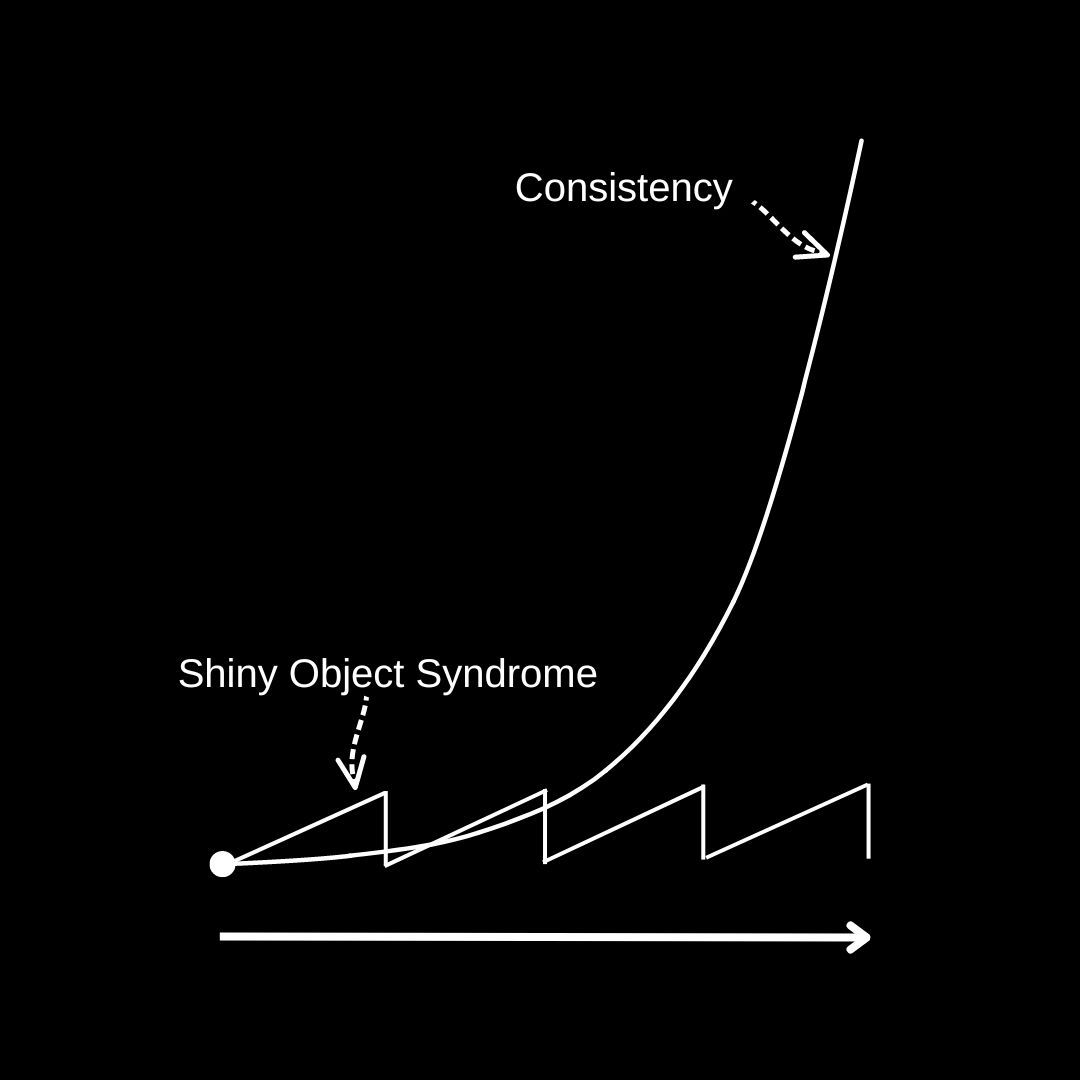
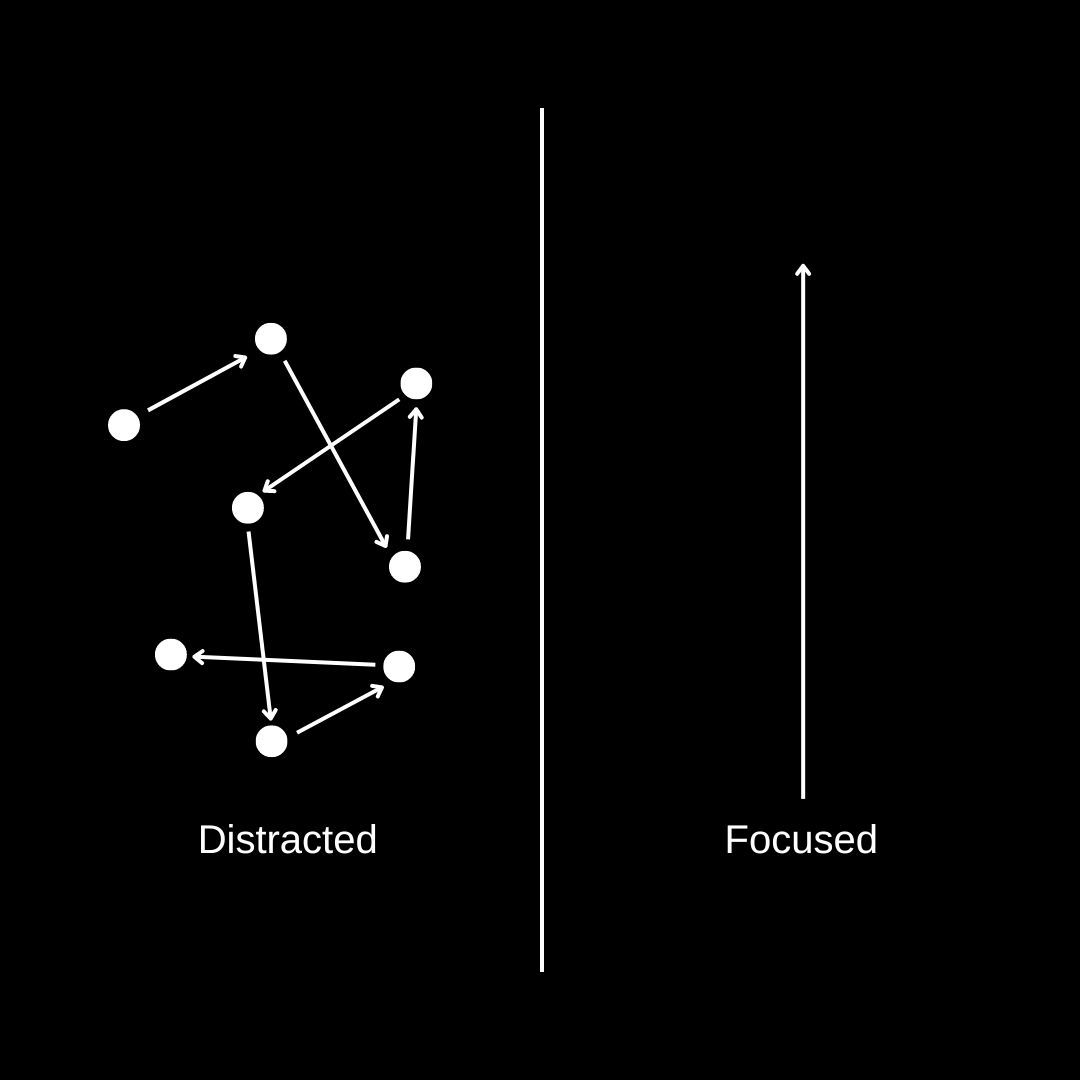
There is a potential analogy between these two concepts in that both involve a certain level of randomness or unpredictability in movement or focus. In the case of Brownian motion, the movement of particles suspended in a fluid is random and cannot be predicted with certainty. In the case of shiny object syndrome, an individual's focus and attention may shift rapidly and randomly from one shiny object or idea to the next, making it difficult to predict or control their attention or focus.
However, it is important to note that Brownian motion is a phenomenon that occurs at the microscopic level and is governed by specific physical laws, while shiny object syndrome is a colloquial term that refers to a behavioral tendency in humans and may not have a particular scientific basis.
The point is: the more you try to do, the less you achieve.
“You can do anything you want” is the worst piece of advice I got as a kid. They should have mentioned time is not unlimited, so you have to pick a few things. Yes, you can do whatever you want to, but when it comes to what you do in life, it’s better not to be spread too thin. Cal Newport said: Focus on the wildly important things.
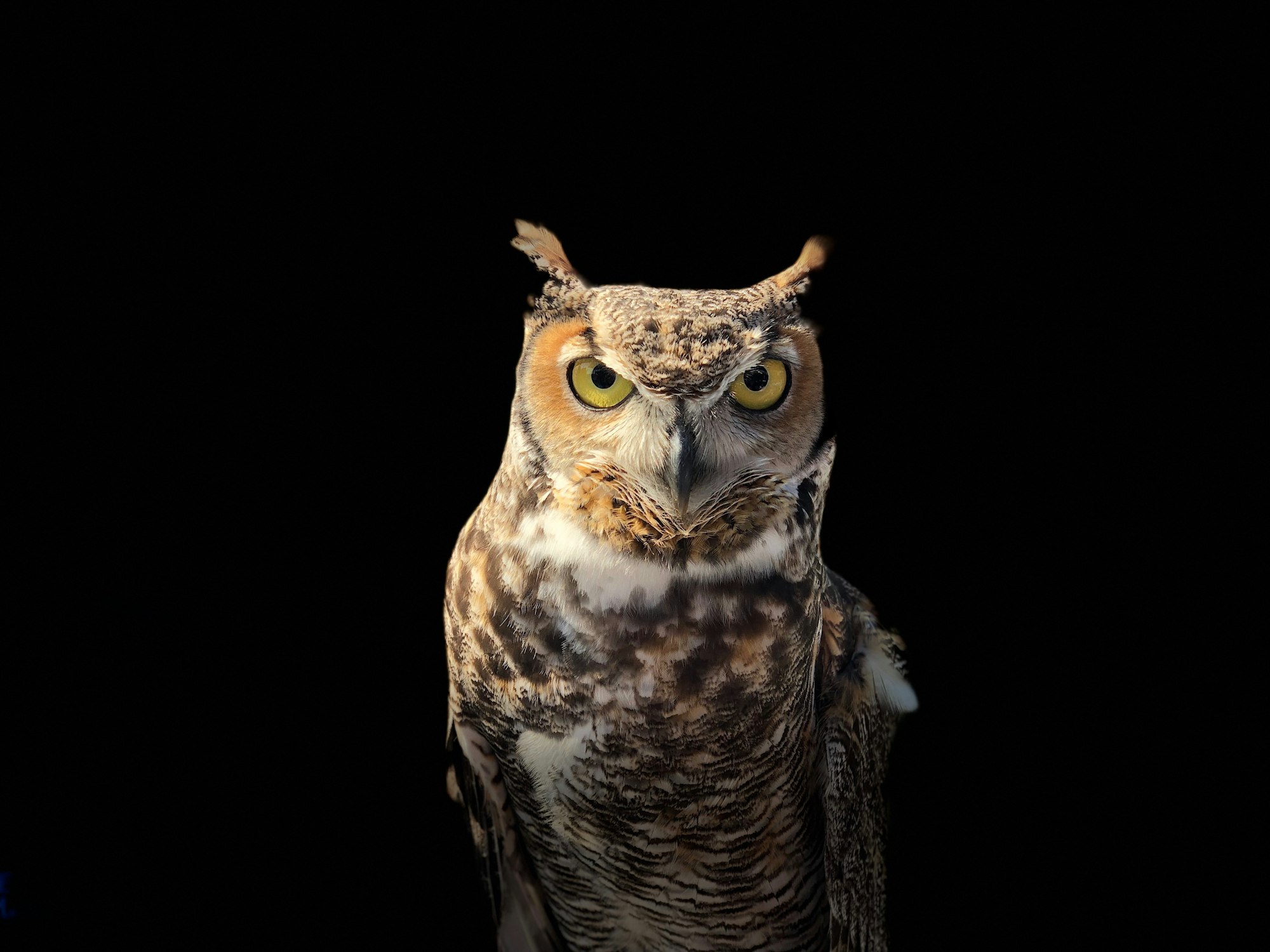
3 - I stopped being a night owl: do the important things early
When I was in college, I was known for pulling off all-nighters to get things done, especially during my Formula Student times, and later on, while working as a freelance CAD designer after classes. For the past two or three years, I tried to do the same, and “hack the system” by learning new stuff at night to advance my career. I’d proudly wear my “We creative geniuses work better at night” t-shirt. But working late and not getting enough sleep isn’t actually a clever thing to do, although many smart people have done it. If you look at the daily routines of actual geniuses, you can see that many of them did most of their work during day time. Yes, some worked during late night hours on their primary creations, but I choose not to take them as role models for the sake of my health.
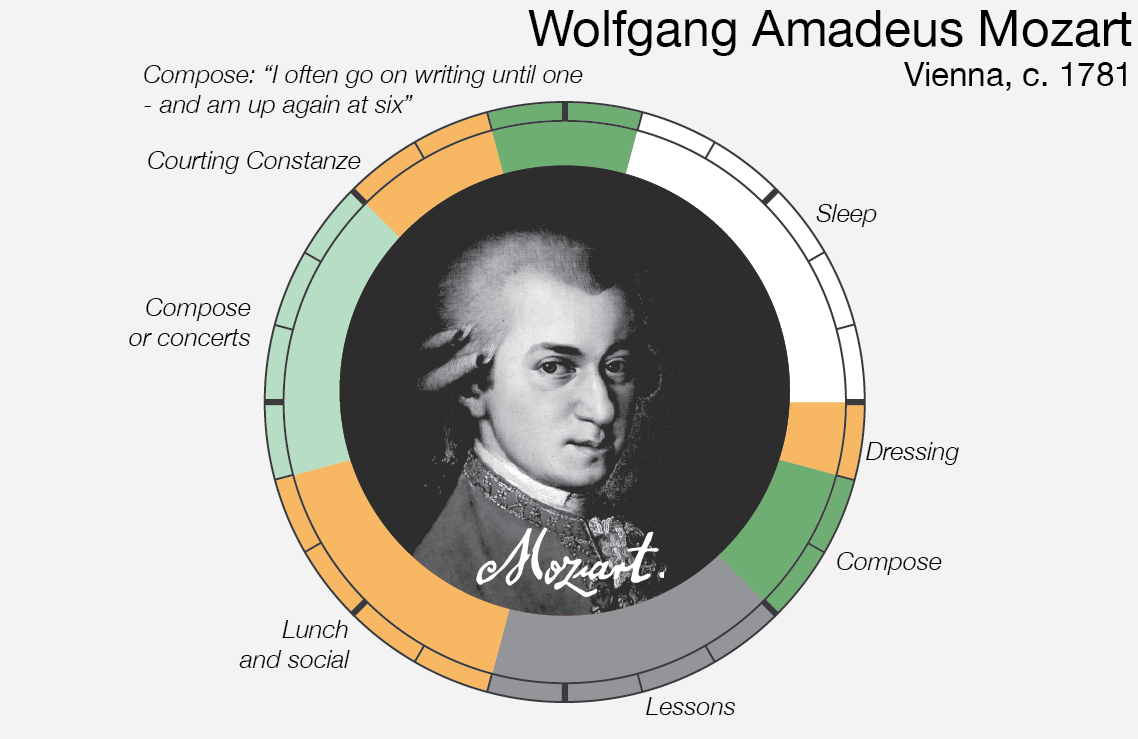
So I started waking up early, at 5:30 am, to do the things that will move me towards my goals and require me to concentrate. Those include learning new things and creating/doing something with what I learn.
The reason is that I love working either very late at night or very early in the morning when everything is quiet and I don’t have distractions. It is much easier for me to concentrate and actually do stuff. I get the sense of complete control of my environment, and I’ve embraced the fact that I need that to concentrate fully. The difference is, if I do it in the morning, my mind is fresh after some good sleep while doing it at night after work was driving me into a vicious circle where I didn’t accomplish much.
As a side effect, I noticed that I sleep much better and more. Which is great. There’s a far bigger chance that I will maintain the habit and continue to dedicate time to my projects every day if I don’t have to sacrifice hours of sleep to do so. This is because I have a clear purpose and something to do when I wake up in the morning. If I don’t wake up early, I won’t have time to make any progress, so I plan accordingly and get to bed early to get enough sleep.
Of course, when I make plans at night to spend time with Uri or my friends, I do not wake up early the next day, but I am sure to resume my habit the day after. The key is: waking up early is easier and healthier to adopt as habit. I prefer that over staying up ‘till late, and getting frustrated because I didn’t do much and have to go to bed because it’s 3 am and will only get 4-ish hours of sleep - been there, not recommended.
4 - I started to embrace failure and be aware of the Sunk Cost Fallacy
My friend, Victor told me about this concept and how it can plague our lives without us really noticing. I made a habit to ask myself whether I keep doing things because I am biased or not.
The sunk cost fallacy is the tendency to continue investing time, money, or other resources into a project or decision because of the resources already invested, even if the project is not likely to be successful or is not the best choice. The classic “I’m already here, I cannot quit or all I’ve done would be just a waste”. This cognitive bias can lead to poor decision-making and can be a source of actual waste and inefficiency.
This concept is based on the idea that it is difficult to let go of resources that have already been invested, even if those resources are not recoverable.
When I realized that, I figured I should let go of some projects I wanted to complete but either weren’t taking me where I want to or were not being successful altogether. A good example of this is when I decided to get a new 3D printer because the one I had was not really working for my purposes, even though I had spent about twice its original price on upgrades and spare parts.
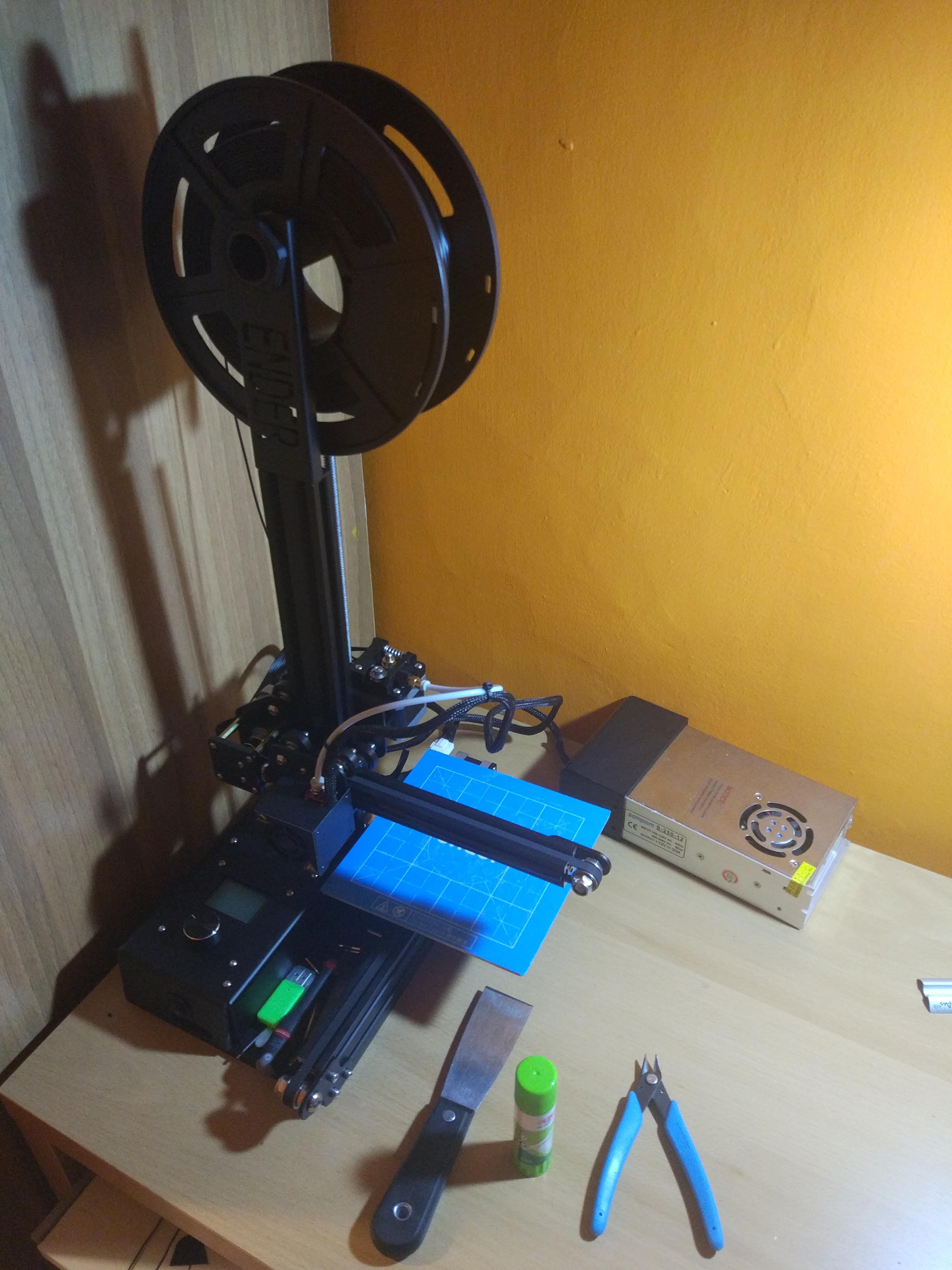
Doing this seems easy when it comes to physical items like a 3D printer. But when it comes to projects, it can be much harder to make the choice. The reality is if you know it's not going to work, or you don't like it at all, there is no reason to keep on with it.
This may seem contradictory since I’ve mentioned before that consistency is key, and consistency sometimes means overcoming the difficult parts, and not quitting when things get hard. But that doesn’t mean you have to complete everything you start, at all costs. Be critical about your time and efforts and determine whether it is worthwhile to go on. Making this a habit is a bit tricky, but you will tell the difference when you are conscious of it. And if something fails, it is completely fine! Actually, it is great, because it means you are doing something. I plan to fail a lot more this new year.

5 - The best way to do something is to actually do it: start small and don't get overwhelmed
This habit is about starting your projects and keeping doing small steps at a time. They don't need to be great, they just need to be done. If you don't at least move in the direction you want, then you won't get there.
I'm a perfectionist, and very, very impatient. It really bugs me. This has caused me problems, because I keep myself from finishing things or, even worse, starting them, out of the fear of not getting the best results or producing the best possible work, or even because I know it would take long before I can get anything actually done. But that’s life. We don’t always reach the best - actually, we rarely or never will, and being great at something or building great things takes time. And that is how it's supposed to be.
Last year, I was afraid of learning how to code in Python because I felt that there were so many people out there who were much more skilled than me. I would say things like: Who am I kidding? It took me years of experience to master CAD to be able to work as a freelancer online, and that was during university - when you are supposed to learn things. I do not have that kind of time now to learn new things having a full-time job. Same for MATLAB, and I only improved a lot because I used it daily at work.
Well, guess what? by just starting to do some basic tutorials, and putting in the hours to practice, I have managed to get the elementary concepts and a bit more than that. I know a lot more than I did last year - heck, I could make a good teacher for my past self! What I mean by this is: we think getting started is the hardest part, because we are looking at the finish line. The actual hardest part is being consistent about it. It’s easier to read a book if you don’t keep thinking about how many pages it has. Focus on completing a few pages every day and you’ll get there. Dan Koe put it very well:
Conclusion
The past year may have had its ups and downs, but it's important to remember to focus on the positive and to be grateful for all that we have. Failures, as I mentioned, are in many cases signs that you are in the right direction or at least doing something. When they are not, it is OK to let go of unsuccessful projects and learn as much as we can from them. The important thing is not being paralyzed and stuck without even initiating our projects in the first place.
I hope you found these 5 habits useful. Maybe I inspired you to read more about them, and perhaps adopt them for yourself in one way or another. The new year is a chance for a fresh start and to adopt habits that will help us reach the long-term goals we keep setting every year. Some of these habits feel like obvious things when someone talks about them, but reading the books I mentioned before really helped me realize the full potential of having a routine and habits to get what you want out of each day.
As we enter 2023, let's make the most of every opportunity that comes our way and strive to make this year the best one yet.
Here's to a happy, healthy, routinary, and successful - or plagued with good failures - 2023!


